This post was written by a visitor to our town who took the Pacers Bike Share for a spin. The original post is located on the blog No Visible Lycra, and a second post on the topic can be found here.
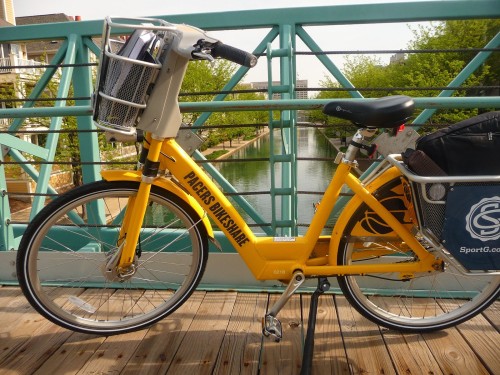
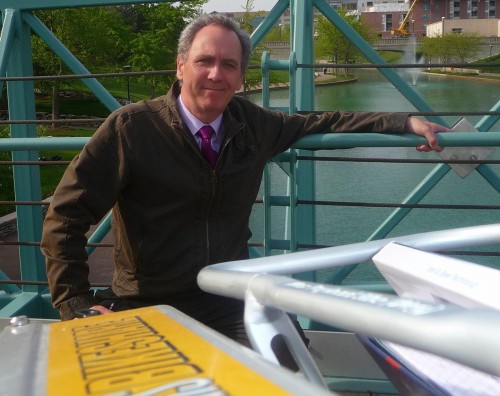
As the day drew to close as far as the convention was concerned and all the work was done, I decided to check out Indianapolis’ new bike share scheme. It costs $8 for a 24-hour pass but you have to put the bikes back into a docking station after 30 minutes. There are plenty of docking stations dotted around the city and every docking station offers maps showing exactly where they (and you) are.
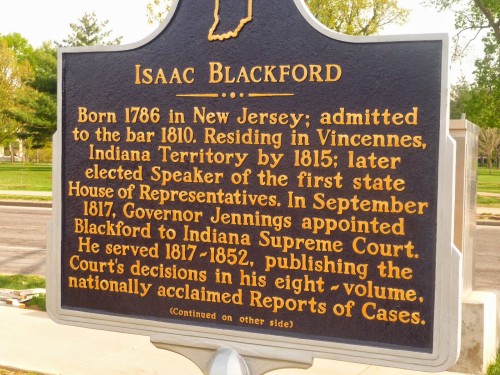
The bikes are bright yellow and have panniers at the rear and a basket at the front. As I had my laptop and a few other things, I used both the panniers and the basket, unhooked a bike and then headed off on the Indianapolis Cultural Trail, a kind of cycle path around the city that takes riders through what can only be described as some of the nicest parts of this city I’ve seen. The weather was good too: sunny, blue skies, very summery, and as soon as I’d mounted the bike I felt good about life.

It was around 17:15 when I set off and, theoretically, I should have returned the bike to a docking station after 30 minutes had elapsed, but I was uncertain what happened after that; would I be able to take out another bike in order to reach home again? Eventually, I had to ask and was told that you simply re-dock the bike and then re-insert your credit card and you can take it out again. I was also told that if you go over they charge you something like $2.00, which is a fair cop. I’d been riding for about 50 minutes, but I wanted to dock my bike back in the docking station from where I’d taken it, so I’ve taken the excess fee on the chin as I didn’t really want to mess about too much.
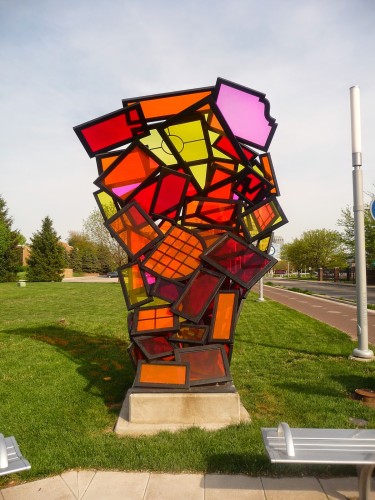
The trail was fantastic. First of all, it was safe. Second, being a lovely day, and given that there was plenty of green space around, I loved every minute of it. The bikes, incidentally, were easy to ride. They had three gears, controlled on the handlebars, and they were very stable too. If there was a problem it was the constant stopping and starting as the trail crossed busy roads like Washington, New York and Michigan. The problem here was that the lights never seemed to change or they would take an age and I found myself edging out on to the tarmac when I saw a break in the traffic rather than wait, which was a little frustrating.

The trail took me past museums and an interesting sculpture – or possibly it was an art ‘installation’, although I’d rather call it sculpture – of some caribou crossing a stream and then onwards, past university buildings hemmed in by green space and then some pleasant-looking houses and a canal on which pedalos could be hired. I eventually turned back on myself and followed the road back to my original docking station where, 50 minutes or so later, I re-docked the bike. It was almost 6pm.
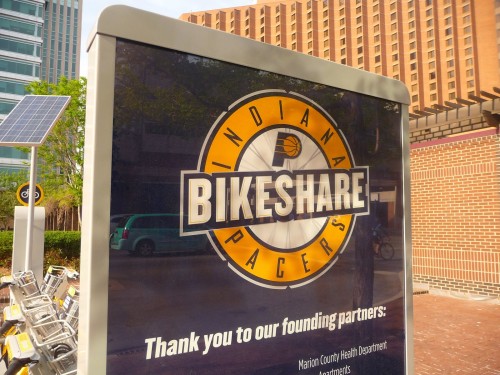
Having riden bike share schemes in Montreal (twice) and in Essen in Germany, not forgetting San Antonio in Texas, I think it would be fair to say that the best ride (and possibly the best bikes) award goes to Indianapolis. It was a real pleasure cycling around the city on a pleasant and safe cycle path and hopefully I’ll get the chance to have another go tomorrow prior to my 24-hour pass running out around 5pm.
Music to my ears.
I’m glad you had a great ride, Matthew.
My personal description of the bikes when people ask is “non-offensive.” What I mean by that is a seasoned bike racer and a newbie that just learned to ride would both hop on and say, “Not bad.” Low center of gravity, easy ingress/egress, and the basket/panniers are probably the highlights for me and most people.
With regards to the stoplight situation, that was one of my complaints last year when I wrote a guest article for Urban Indy. I am completely baffled how the Trail doesn’t get a dedicated light cycle at EVERY SINGLE CROSSING. I typically ride from the Market to Fletcher Place and if you don’t hit the button at New Jersey and South St, you never get the walk signal.
Hmm, the link didn’t show up:
https://urbanindy.com/2013/05/16/guest-post-cultural-trail-coulda-shoulda-woulda-by-andy-howard/
That was one of my favorite posts on this site. Unfortunately, I don’t think too many of those issues have been addressed. Have the signals at Ohio & Alabama been corrected to give peds the full duration of the green light (not including the conflicting left turn time of course)?
Yeah, the lights at both Ohio and New York were updated and have the appropriate amount of time.
The Bankers Life garage portion is still completely unusable more than one year after the grand opening of the trail.
Other than that, none of the others have been addressed to my knowledge. I still run into lights that only change with a button press (namely New Jersey and South St).
Yeah, both rides were very good. If I ever get back to Indy I’ll stay downtown and use the bikes more often.
Wow. That blog makes my day!
It’s the combination of the bikes and the Cultural Trail that makes Indy’s situation unique. Otherwise, our bikeshare is about on par with every other one I’ve experienced in cities throughout the US and Europe. Used CitiBikes here in NYC yesterday. Just fine.
Well, I live in London and I used to ride to work – from South to North London – and it’s pretty scary. We’ve had a lot of media publicity recently surrounding fatal clashes between cyclists and lorry (truck) drivers and for this reason I’ve never used the so-called Boris Bikes in town. London hasn’t done what Indianapolis has done (ie, created defined cycle paths like the cultural trail) and, indeed, hasn’t followed the European model (cycling in Holland is very safe, for example). In London, ‘they’ think that by painting a symbol of a bike on the road and ruling off the ‘space’ for bikes with a thick white line, that’s enough; it clearly isn’t. In all the American (and Canadian) cities I’ve visited that have bike share schemes (San Antonio, Montreal and Indianapolis) the traffic has been far, far less heavy than it is in London, although I’m guessing on a par with NYC. I saw that they have a bike share scheme in Chicago (it took me two days to get home from Indy) but I never had the time to use it.
With the exception of the Cultural Trail (which I acknowledged was a unique part of our bike paths) Indy hasn’t done much more than what London has done to its streets. And it really isn’t fair to compare London to Indianapolis given the vast differences in populations, traffic density, and the like. Bikeshare is pretty much bikeshare in my experience riding in a large number of cities. As you note it is the actual bike infrastructure on the streets that can make the difference.
I wasn’t comparing them negatively, just making the point that I’d rather use a bike share scheme in Indianapolis than London BECAUSE London is a huge, traffic-heavy city full of trucks and Indianapolis isn’t. But yes, generally speaking, the UK is not a cyclist-friendly place unless, like me, you cycle around the Greater London area early in the morning and along semi-rural country lanes and through market towns. In London they separate bikes from cars and trucks simply by painting a white line in the road and it’s not good enough, especially as more and more people are riding bikes into the capital.
Well I think (and this is me not knowing much, if at all, about London’s streets or if it even has suburbs or whatever) Indianapolis’ downtown area has a few added benefits beside the cultural trail for cyclists.
A lot of the streets in the downtown area are relatively wide with several lanes and several are one way streets. I think that makes it naturally easy for cyclists even without a bike lane because it gives several ways for motorists to pass them. And as you get closer to the downtown area, traffic tends to slow down anyway. Except on Delaware, where people drive like maniacs anyway.
There are also a handful of other multi use trails that can lead into and from downtown such as the Monon Trail, Fall Creek Trail (which I recently had the pleasure of riding and greatly enjoyed) and the White River Trail (though portions of this trail really need some repaving). We also have that separated bike path that leads to Greenwood which I think is awesome.
I think cycling becomes a bit more of a challenge in the city as you leave downtown and you leave the areas with multi-use trail. I haven’t been as great about cycling this year as I have in years past. But even at my best, I avoided being on streets like Kessler Blvd because people just aren’t accustomed to seeing cyclists on that road.
I would disagree with your take on the one way streets downtown. They have a number of drawbacks which I am keenly aware of because I ride on them when I have to.
1) Speed – The traffic on those streets goes about 45-55mph in spite of speed limits of 35-40mph. If you design a road for 50mph, traffic will go 50mph regardless of the posted speed limit.
2) Timed lights – Not only does the traffic move very fast, but it moves in clumps of about 20-30 cars because the lights are timed. A group of this many cars, traveling at 50mph is extremely loud and intimidating. Additionally this contributes to the speed issue because the cars never have to slow down.
The only time I’ve seen the traffic be reasonable for riding is when there is a traffic jam. Even in the core, the cars are very fast.
These need to be two way, narrower streets or we will see one of two things: no cyclists or dead cyclists.